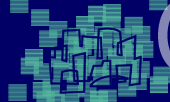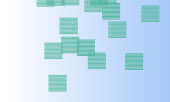Schedule (subject to change)
|
8:10 am |
Breakfast Arrives at Vassar and Main (be there!) |
|
8:20 am |
Bus Leaves for Gloucester |
|
9:45 am |
Registration Check-in |
|
10:00 am |
Opening Remarks |
|
10:15 am |
Session 1: Bio Systems/HCI |
|
11:15 am |
Break |
|
11:25 am |
Session 2: Systems |
|
12:25 pm |
Demo / Poster
Session |
|
1:00 pm |
Lunch / Activities Break |
|
3:30 pm |
Session 3: Learning/Vision |
|
4:30 pm |
Break |
|
4:40 pm |
ITA Talk: Sundar
Narasimhan |
|
5:10 pm |
Session 4: Learning/Language |
|
6:10 pm |
Break |
|
6:20 pm |
Dinner |
|
7:20 pm |
Dinner Talk: Prof. Manolis
Kellis |
|
8:00 pm |
Closing Remarks / Awards |
|
8:30 pm |
Return to Vassar and Main |
|
8:30 pm |
Independent Gloucester Evening Outings |
Session 1: 10:15am ~ 11:15am
Bio Systems/HCI
Session Chair: Max Goldman
Talk | Computational Models for Representation Change in Human Learning
Jennifer Roberts
Talk | An Interpretation Game for Learning Mandarin Chinese
Chih-yu Chao, Stephanie Seneff and ChaoWang
Talk | Information Scraps: Eluding our Personal Information Management Tools
Michael Bernstein, Max Van Kleek and David R. Karger
Session 2: 11:25pm ~ 12:25pm
Systems
Session Chair: Angelina Lee
Talk | Byzantine Fault Tolerant
Cooperative Caching
Raluca Ada Popa, James Cowling and Barbara Liskov
Talk | ATAC: On-Chip Optical Networks for Multicore Processors
James Psota, Jonathan Eastep, Jason Miller, Theodoros Konstantakopoulos, Michael Watts, Mark Beals, Jurgen Miche and Kim Kimerling
Talk | Nested Parallelism in Transactional Memory
Kunal Agrawal, Jeremy T. Fineman and Jim Sukha
Session 3: 3:30pm ~ 4:30pm
Learning/Vision
Session Chair: Kate Saenko
Talk | Audio-Visual Co-training with Partial Redundancy
C. Mario Christoudias and Trevor Darrell
Talk | Unsupervised Activity Perception by Hierarchical Bayesian Models
Xiaogang Wang, Xiaoxu Ma and Eric Grimson
Talk | Apparent Ridges for Line Drawing
Tilke Judd
Session 4: 5:10pm ~ 6:10pm
Learning/Language
Session Chair: Gabriel Zaccak
Talk | Kingman's Coalescent, the Dirichlet Process, and Priors for Relational Data
Daniel M. Roy and Yee Whye Teh
Talk | Compositional Semantics in Scheme with Named Entity Recognition
Gregory Marton, L. Brown Westrick and Eric Eisner
Talk | Variational Inference in the Infinite-Mixture HMM
Jacob Eisenstein
Demo Session: 12:25pm ~ 1:25pm
Demo | Spoken Dialogue System for Foreign Language Learners
Ian McGraw, Spoken Language Systems
Much of the second language acquisition (SLA) scholarship suggests that conversational skills are best acquired through communication in the target language. Although in recent decades communicative approaches to language teaching have seen widespread adoption in the classroom, it remains exceedingly difficult to assign conversational homework with the tools currently available. In recent years, the Spoken Language Systems lab has been working to fill this hole in the language education curriculum. In the upcoming CSW demo session, we would like to present one of our systems: a conversational game in Mandarin Chinese. Despite making heavy use of automatic speech recognition, the game is intended for speakers with NO previous experience in Mandarin.
Demo | Unmanaged Internet Architecture
Jacob Strauss and Chris Lesniewski-Laas, UIA Group
We will demo UIA creating an ad-hoc multihop network amongst several mobile devices, and demo UIA's secure decentralized name system. Depending on what demos are working, we may demo SST's (structured streams transport) stream prioritization features, and/or Alpaca's (a proof-carrying authentication security framework) ability to interface the name system with MIT certificates.
Demo | Video LabelMe
Ce Liu, Computer Vision Group
We designed a video labeling tool for the users to label objects and activities in video sequence with the assistance of computer. A large video ground-truth database is created using this tool. We shall show the real-time demo of the tool, a subset of the database, and some promising applications in computer vision and computer graphics.
Demo | Intelligent Traffic Navigation System
Sejoon Lim, Distributed Robotics Group
This demo is about intelligent traffic navigation system. I will give a demo with a web-based interface. A poster about our research can be prepared.
Demo | Underwater Robotics in the Arctic
Chris Murphy and Clay Kunz, Woods Hole Oceanographic Institution Joint Program
We will present research we were involved with this summer using underwater robotics in the Arctic. The work was performed during the Arctic Gakkel Vents Expedition, as part of the International Polar Year's focus on Arctic discovery. Areas of specific interest include the development of a novel high-definition camera system which successfully acquired many hours of seafloor footage, development of new techniques for deploying and recovering underwater vehicles under ice, and a brief description of expedition results.
Dinner
Talk: 7:20pm ~ 8:00pm
Programming Language of the Human Genome
The oldest digital computer was fully functional more than a billion years ago, and its living descendants, including ourselves, have populated all niches of life. The sequencing of the human genome marked the most exciting moment of introspection in the history of evolution, and has left our species staring at 3 billion letters of DNA, and wondering how it all works. In this talk, I will focus on how computer science can make a big difference in this endeavor, and outline our recent results on understanding complete genomes, their cellular circuitry, and their evolutionary dynamics, using dozens of mammalian, fly, and fungal genomes.
Speaker: Prof. Manolis Kellis, MIT
Computational Biology Group
 Manolis Kellis is an Assistant Professor
of Computer Science at MIT, a member of the Computer Science and Artificial
Intelligence Laboratory, and of the Broad Institute of MIT and Harvard. Prof.
Kellis holds the Distinguished Alumnus (1964) Career Development Professorship
at MIT. He was selected by Technology Review magazine as one of 35 top young
innovators in science and technology in 2006, for his research in genomics. He
was also recognized as one of three young scientists representing the next
generation in biotechnology by the Museum of Science. Prof. Kellis research
interests are in computational biology, and in particular the areas of genome
interpretation, comparative genomics, gene regulation, and genome evolution. He
has also been instrumental in helping to develop MIT's emerging curriculum in
bio-CS, and has developed a new undergraduate course in algorithmic aspects of
computational biology, and a graduate-level course on Computational Biology:
Genomes, Networks, Evolution. He obtained his Ph.D. from MIT, where he received
the Sprowls award for the best doctorate thesis in computer science, and the
first Paris Kanellakis graduate fellowship. Prior to computational biology,
Manolis worked on artificial intelligence, sketch and image recognition,
robotics, and computational geometry, at MIT and at the Xerox Palo Alto
Research Center. Manolis lived in Greece and France before moving to the US.
Manolis Kellis is an Assistant Professor
of Computer Science at MIT, a member of the Computer Science and Artificial
Intelligence Laboratory, and of the Broad Institute of MIT and Harvard. Prof.
Kellis holds the Distinguished Alumnus (1964) Career Development Professorship
at MIT. He was selected by Technology Review magazine as one of 35 top young
innovators in science and technology in 2006, for his research in genomics. He
was also recognized as one of three young scientists representing the next
generation in biotechnology by the Museum of Science. Prof. Kellis research
interests are in computational biology, and in particular the areas of genome
interpretation, comparative genomics, gene regulation, and genome evolution. He
has also been instrumental in helping to develop MIT's emerging curriculum in
bio-CS, and has developed a new undergraduate course in algorithmic aspects of
computational biology, and a graduate-level course on Computational Biology:
Genomes, Networks, Evolution. He obtained his Ph.D. from MIT, where he received
the Sprowls award for the best doctorate thesis in computer science, and the
first Paris Kanellakis graduate fellowship. Prior to computational biology,
Manolis worked on artificial intelligence, sketch and image recognition,
robotics, and computational geometry, at MIT and at the Xerox Palo Alto
Research Center. Manolis lived in Greece and France before moving to the US.





